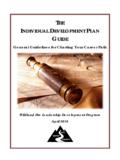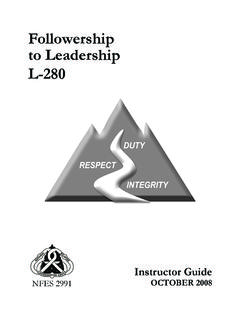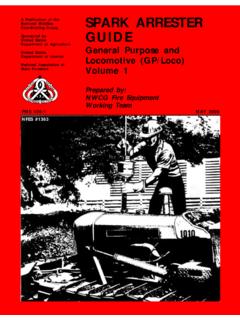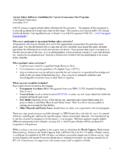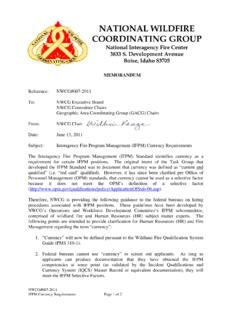Transcription of Wildland Fire Leadership Curriculum Management Unit Guide
1 Wildland fire Leadership Curriculum Management unit Guide nwcg Leadership Subcommittee April 2017 Wildland fire Leadership VALUES AND PRINCIPLES i TABLE OF CONTENTS INTRODUCTION .. 1 nwcg Leadership Subcommittee Mission Statement .. 3 Background/Overview .. 3 Responsibilities .. 3 Curriculum Management unit .. 3 L- Curriculum OVERVIEW .. 5 L-180, Human Factors in the Wildland fire Service .. 7 L-180 Curriculum Management unit .. 7 Course History .. 7 Course Description .. 7 Objectives .. 7 Course Components and Hours to Complete .. 7 Target Group .. 7 Course Prerequisites .. 7 Course Level .. 7 Pre-Course Work .. 8 Course Access and Additional Course Information .. 8 L-180 Minimum Instructor Qualifications .. 8 L-280, Followership to Leadership .. 9 L-280 Curriculum Management unit .. 9 Course History .. 9 Course Description .. 9 Objectives .. 9 Course Components and Hours to Complete .. 9 Target Group .. 9 Course Prerequisites .. 9 Course Level.
2 9 Field Leadership Assessment Course (FLAC) 9 Pre-Course Work .. 10 Part 1 .. 10 Part 2 .. 10 What to Bring to Class .. 10 L-280 Minimum Instructor Qualifications .. 10 L-380, Fireline Leadership .. 11 L-380 Curriculum Management unit .. 11 Course History .. 11 Course Description .. 11 Objective .. 12 Course Components and Hours to Complete .. 12 Target Group .. 12 Course Prerequisites .. 12 Course Level .. 12 Pre-Course Work .. 12 L-380 Minimum Instructor Qualifications .. 12 L-380 Instructional Design Criteria .. 12 Intent .. 13 Instructional Design Guidelines .. 13 Content Guidelines .. 13 Application of Leadership Styles .. 14 Communication 14 Team Building and Problem Solving .. 14 Detecting and Mitigating Decision Errors .. 14 Managing Stress and Other Human Factors .. 15 ii L-381, Incident Leadership .. 17 L-381 Curriculum Management unit .. 17 Course History .. 17 Course Description .. 17 Objective .. 18 Course Components and Hours to Complete.
3 18 Target Group .. 18 Course Prerequisites .. 18 Course Level .. 18 Pre-Course Work .. 18 L-381 Minimum Instructor Qualifications .. 18 L-381 Instructional Design Criteria .. 19 Intent .. 19 Instructional Design Guidelines .. 19 Content Guidelines .. 20 Command Presence and Command Climate .. 20 Leader s Intent .. 20 Rapid Team Building .. 20 Communication 20 Detecting and Mitigating Decision Errors .. 21 Operational Tempo Awareness .. 21 Self-development Actions .. 21 L-480, Organizational Leadership in the Wildland fire Service .. 23 L-480 Curriculum Management unit .. 23 Course History .. 23 Course Description .. 23 Objective .. 23 Course Components and Hours to Complete .. 24 Target Group .. 24 Course Prerequisites .. 24 Course Level .. 24 Pre-Course Work .. 24 L-480 Minimum Instructor and Coach Qualifications .. 24 Instructor Cadre Education Credentials .. 24 Instructor Cadre Experience .. 24 Instructor Cadre Knowledge .. 25 Personal Assessment Knowledge.
4 25 Team/Organizational Leadership Knowledge .. 25 Coach Qualifications .. 26 L-480 Instructional Design Criteria .. 26 Intent .. 26 Instructional Design Guidelines .. 26 Content Guidelines .. 27 Individual Leadership Traits Personal Inventory .. 27 The Application of Leadership in the Team/Organizational Environment .. 28 L-481, Advanced Leadership for Command and General 29 L-481 Curriculum Management unit .. 29 Course History .. 29 Course Description .. 29 Objective .. 30 Course Components and Hours to Complete .. 30 Target Group .. 30 Course Prerequisites .. 30 Course Level .. 30 Pre-Course Work .. 30 L-481 Minimum Instructor and Cadre Qualifications .. 30 Cadre Credentials .. 31 Cadre Knowledge and Experience .. 31 Coach Qualifications .. 31 L-481 Instructional Design Criteria .. 31 Intent .. 32 Course Design Guidelines .. 32 Integrated Curriculum .. 32 Student-to-Instructor 33 Case Studies .. 33 Student Assessment .. 33 iii Training Program Requirements.
5 34 Background .. 34 Purpose .. 34 Program Outcomes .. 35 Overview .. 35 Instructional Package Requirements .. 39 Delivery Sustainment Requirements .. 39 Other Prospective Provider Requirements .. 39 L-580, Leadership Is Action .. 40 L-580 Curriculum Management unit .. 40 Course History .. 40 Course Description .. 40 Objective .. 41 Course Components and Hours to Complete .. 41 Target Group .. 41 Course Prerequisites .. 41 Course Level .. 41 Pre-Course Work .. 41 Current L-580 Events .. 41 Additional Information .. 42 Nomination Processes .. 42 Battle of Gettysburg Staff Ride (IQCS session #00008) .. 42 L-580 Minimum Instructor Qualifications .. 43 Becoming an nwcg -Approved L-Course Provider .. 43 L-580 Guiding Principles .. 43 PROCEDURES FOR BECOMING AN nwcg -APPROVED PROVIDER .. 45 Becoming an nwcg -Approved L-180 Provider .. 47 Becoming an nwcg -Approved L-280 Provider .. 47 Becoming an nwcg -Approved L-380, L-381, L-480, L-481, or L-580 Provider.
6 47 Step 1: Examine the Course Description and Minimum Instructor 47 Step 2: Become Familiar with Instructional Design Criteria and Course Evaluation Process, Program Intent, and Resources .. 47 Step 3: Contact the Appropriate nwcg Leadership Curriculum Management unit Lead (CMUL) .. 48 Course Development Documentation 48 Step 4: Contact the Geographic Area Training Representative (GATR) in Your Area .. 49 Step 5: Prepare for Test Course Delivery .. 49 Step 6: Deliver Test Course(s) for Evaluation .. 49 Evaluation Team .. 49 Evaluation Format .. 50 New Lead Instructor Certification Checklist .. 52 APPENDIX A: APPLICATION FOR COURSE REVIEW .. 53 Application for Course Document Review .. 55 APPENDIX B: EVALUATION FORMS .. 57 L-380 Evaluation Form .. 59 L-381 Evaluation Form .. 67 L-480 Evaluation Form .. 75 L-481 Evaluation Form .. 81 L-580 Evaluation Form .. 90 iv (This page intentionally left blank.) 1 INTRODUCTION2 (This page intentionally left blank.)
7 3 nwcg Leadership SUBCOMMITTEE MISSION STATEMENT To promote cultural change in the workforce and to emphasize the vital importance of Leadership concepts in the Wildland fire service by promoting educational and Leadership development opportunities. BACKGROUND/OVERVIEW The National Wildfire Coordinating Group ( nwcg ) Leadership Subcommittee (LSC), under the Operations and Training Committee, is responsible for the Management of Wildland fire Leadership Development Program (WFLDP), including the Wildland fire Leadership Values and Principles, the nwcg l eadership (L-series) Curriculum , and Leadership development resources found within the Leadership Toolbox on the WFLDP website ( ). RESPONSIBILITIES Beyond Management of the WFLDP resources, the LSC has specific responsibilities to provide a fair and impartial standard and evaluation process through which courseware and potential providers of L-series courses can be reviewed. This may include, but is not limited to, review and approval of: Proposed courseware materials and support items for inclusion into the Curriculum .
8 Proposed courseware design and development documentation. Prospective provider performance and delivery systems and capability, including instructors. Curriculum Management unit Each course within the Curriculum is managed by a steward or group of individuals known as a Curriculum Management unit (CMU). The CMU provides course design and evaluation assistance upon agency request to determine if a prospective provider (public or private) meets the requirements to become an Approved Provider. The CMU is solely responsible for establishing program specifications, determining program and provider evaluation criteria, and for approving potential providers. The CMU approves training programs which meet or exceed the established specification. In support of quality delivery, the LSC also approves organizations and individual instructors as appropriate. The nwcg LSC has assigned a Curriculum Management unit Lead (CMUL) to each L-course. The role of the CMUL is to serve as a point of contact (POC) for the review and certification process of L courses and to provide appropriate nwcg review resources as needed to support the process.
9 The CMUL works as a coordinator to provide feedback as appropriate to the potential provider during and after the certification process. The CMUL also acts as the LSC POC for all delivery, auditing, compliance, and recertification issues. 4 (This page intentionally left blank.) 5 L- Curriculum OVERVIEW6 (This page intentionally left blank.) 7 L-180, HUMAN FACTORS IN THE Wildland fire SERVICE L-180 Curriculum Management unit Ashleigh D Antonio (Co-Lead) 208-315-2857 Brandon Selk (Co-Lead) 605-642-4622 COURSE HISTORY First course delivery April 2000 nwcg approval date for L Curriculum June 2002 IQCS creation date pre-IQCS Revision date(s) September 2008 First online course delivery 2014 COURSE DESCRIPTION The L-180, Human Factors in the Wildland fire Service, course exposes students to human performance concepts as part of basic Wildland firefighter training. The course is specifically designed for entry-level operational personnel; however, this course also applies to all Wildland fire service personnel, including non-operational personnel.
10 A classroom training package is available in the nwcg Publication Management System; the online course is available through nwcg Online Course Materials, and an adapted version is included as unit 4 in the 2003 edition of S-130, Firefighter Training. All versions of the course are designed to be interactive. Topics include situation awareness, basic communication responsibilities, attitude and stress barriers, decision making processes, and teamwork principles. This course is offered at the local level using the minimum instructor qualifications and instructor certification guidelines listed in the Field Manager s Course Guide . OBJECTIVES Introduce human performance factors in high-risk work environments and add this knowledge to student s skill set. Provide opportunities to explore human performance concepts and related vocabulary. Reinforce professional responsibility to address human performance issues while on the job. COURSE COMPONENTS AND HOURS TO COMPLETE Classroom Online Pre-selection assessment N/A N/A Pre-course work N/A N/A Online training N/A 4 Instructor-led training 4 N/A Total Hours 4 4 TARGET GROUP Entry-level incident personnel COURSE PREREQUISITES None COURSE LEVEL Local 8 PRE-COURSE WORK None COURSE ACCESS AND ADDITIONAL COURSE INFORMATION Click here to go to the L-180 online course.
